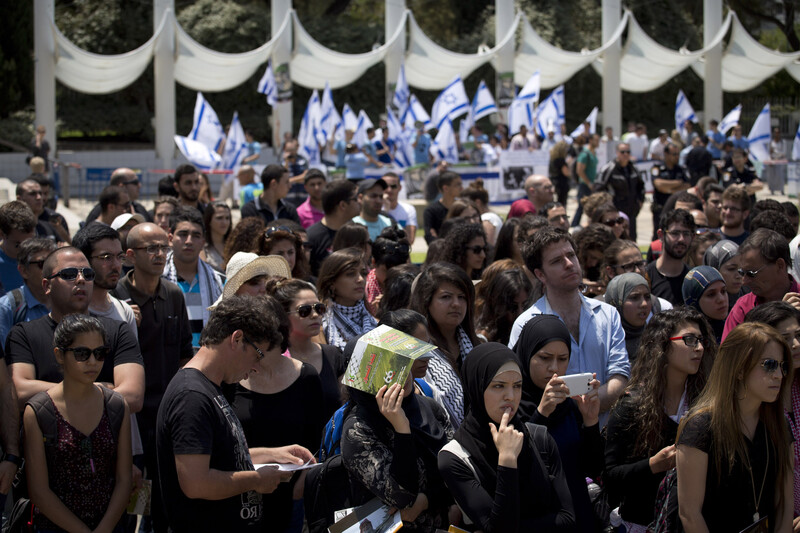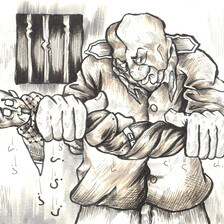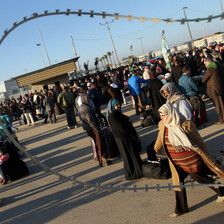The Electronic Intifada 22 May 2014

Students commemorate the Nakba as right-wing nationalists with Im Tirtzu carrying Israeli flags try to interrupt the ceremony outside Tel Aviv University, 11 May.
ActiveStillsSamer Asakli expects anti-Palestinian racism at Haifa University, but he did not imagine he would be punished after commemorating the Nakba, what Palestinians term the ethnic cleansing of their homeland in 1948, on campus on 12 May.
When approximately fifty Palestinians gathered for a small commemoration in an outdoor area on campus, they were surrounded by dozens of police officers and university security guards. Rightwing Jewish students from the Im Tirtzu movement, an ultra-nationalist group whose members have previously threatened Palestinian students at Israeli universities, were allowed to protest the commemoration by waving Israeli flags.
As if it weren’t bad enough that the student union threw a dance party to humiliate the Palestinian students who had gathered to quietly commemorate the Nakba after the university revoked a permit to hold a rally, Asakli said he was informed that he and four other participants were banned from “being seen on campus outside of our lectures.”
Two organizers were fully suspended for the duration of the school year, but a local court reversed that decision on Tuesday following a petition by Adalah, a Haifa-based advocacy group that works to promote the rights of Palestinians in Israel.
“It is unfortunate we needed to turn to the courts to convince Haifa University not to harm the students’ rights to protest and express their opinion. The university’s decision was arbitrary and extreme,” attorney Sawsan Zaher, who represented the students, was quoted as saying in an Adalah press release.
Groups banned
“I have a clean record,” Asakli, a 22-year-old undergraduate studying political science, told The Electronic Intifada. “I have never been in trouble with the university and have good grades.”
Haifa University’s administration also announced that three left-wing Palestinian student groups — al-Jabha, Balad and Abna al-Balad — are now banned from holding political events on campus for the remainder of the semester.
As Israeli universities and the authorities have escalated a crackdown on Palestinian students in recent years — including police harassment at peaceful protests, the arrests of student activists and routinely denying Palestinian students’ requests to hold events — Nakba commemorations have become a focal point for Israeli politicians and school administrations.
On Monday this week, dozens of students protested on campus against the university’s decision to punish the students.
“Haifa University wants to prevent the word of our Nakba getting out in any way,” Asakli said. “They give us excuses to deny all of our protests or ceremonies … they say things like there is no available space or there is no auditorium for our lectures.”
Suspended
Asakli, from the village of Meghar, is active in the youth communist movement in present-day Israel.
He refused to serve in Israel’s occupation military by intentionally failing a mental aptitude test and gaining exemption. Asakli is a member of the Druze religious minority, who unlike other Palestinian citizens of Israel are required to serve in the army.
Yet this is the first time the university targeted Asakli for punishment, he said.
Though the university initially approved an application submitted by a number of Palestinian student groups, the organizers were later informed that the permission was revoked. However, they decided to go ahead with the Nakba commemoration.
Afterwards, when the students attempted to bring lawyers to university in order to accompany them during talks with the administration, campus security prevented them from entering.
Tareq Yassin is the secretary of Haifa University’s student wing of al-Jabha, a left-wing political party in Israel. Along with Ahmad Masalha, the secretary of the student wing of Abna al-Balad, a Palestinian political movement in present-day Israel, 23-year-old Yassin was initially suspended for the remainder of the semester.
“I was targeted because I was one of the organizers,” he said. “Al-Jabha party has had a lot of problems at Haifa University. For the last three years, they have denied all of our requests to commemorate the Nakba.”
“Racist talk”
However, Israeli students with the extreme right Im Tirtzu were not punished when they protested without the university’s approval.
In addition to protesting the Nakba commemoration, “[Im Tirtzu] were passing out flyers full of racist talk about Arabs and offensive claims about the Nakba,” said Yassin.
Haifa’s dean of students tried to mitigate criticism of the university by telling the Israeli daily Haaretz that he did not approve of the student union playing music during the Nakba commemoration.
However, the seven Palestinian students were the only ones punished, while the Jewish Israeli students who held an unapproved event were not.
Yassin added that Im Tirtzu is allowed to act freely on campus “without any problems whatsoever.”
“Im Tirtzu shows up at all of our events,” said Asakli. “Even right-wing extremists like the settler Baruch Marzel have come to the university without the administration’s permission, but they do not have any problems or consequences.”
Marzel is an American-born Israeli settler who lives in a Jewish-only colony in the occupied West Bank city of Hebron. Known for his extremism, he has been prevented from entering Israeli campuses in the past.
Marzel and other settlers are known to attack Palestinian residents of Hebron, according to activists based in that city. Elsewhere, he has organized violent rallies against African asylum seekers in Tel Aviv, and harassed an Israeli minister in response to Israel’s participation in negotiations with the Palestinian Authority.
More recently, in February 2013, Marzel visited the university to rally support in the elections for Israel’s parliament, the Knesset.
Haifa University also recently prevented student groups from bringing Muhammad Kanaaneh, a prominent Palestinian politician, for a speaking event last week. Kanaaneh — who was imprisoned by Israel for more than four years for “contact with a foreign agent” — was arrested the moment he arrived on campus.
“The university told us that he is a security threat,” Asakli said, adding that the administration did not explain how Kanaaneh’s lecture posed a threat.
Police also banned Kanaaneh, who is a senior member of Abna al-Balad, from coming to the city of Haifa for fifteen days.
Last month, Tel Aviv University also banned Kanaaneh from campus and from giving a lecture about Palestinian history. Although the university granted left-wing student organizations permission to host Kanaaneh, that permission was subsequently revoked following right-wing protests against the event.
“We always see these racist policies against Palestinians in all of the universities. They send security and police to all of our events on campus,” Yassin said. “It is a reflection of the state’s racist policies against Palestinians on a smaller level in the academic settings.”
“All of the extremist right-wing movements like Im Tirtzu get a free pass in Israel,” Yassin added. “But they have a created a militarized environment for Palestinian students.”
Systematic discrimination
Nearly 1.7 million Palestinian citizens live in villages, towns and cities across present-day Israel. Dozens of discriminatory laws stifle their political freedoms and limit their access to land and other state resources.
Palestinian rights groups in Israel have documented systematic discrimination against Palestinian students at Israeli universities. The Arab Culture Association’s annual report for 2011-2012 documents dozens of instances in which universities “limited the freedom of expression of Arab students and groups.”
At Hebrew University in occupied East Jerusalem, around 200 students assembled for a Nakba commemoration on 14 May.
Students told The Electronic Intifada that there was a heavy police presence in addition to the university security.
Palestinian student groups at Hebrew University decried the measures taken against them in a statement addressing the general uptick in repression: “The university administration could not help but feel ashamed due to the contradiction between these kinds of oppression and the fake image it is trying to send to the world as being a liberal and democratic space.”
Hundreds also gathered in front of Tel Aviv University on 11 May, where dozens of students shared personal testimony of their families’ dispossession, read out the names of destroyed villages and recited Palestinian poetry.
Both events were protested by Israeli students from Im Tirtzu and greeted with police intimidation.
But Palestinian student groups at Haifa University intend to continue commemorating the Nakba and other Israeli massacres against the Palestinians.
“The universities and other institutions in Israel are horrified of the word ‘Nakba,’” said Asakli. “And that’s because they know that they are part of the problem.”
Patrick O. Strickland is an independent journalist and regular contributor to The Electronic Intifada. His website is www.patrickostrickland.com. Follow him on Twitter: @P_Strickland_.





